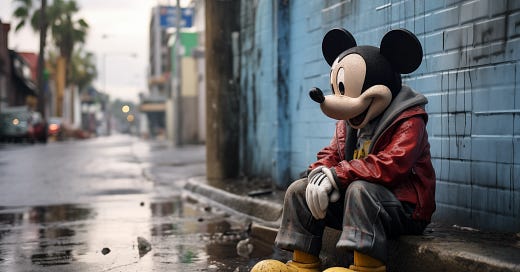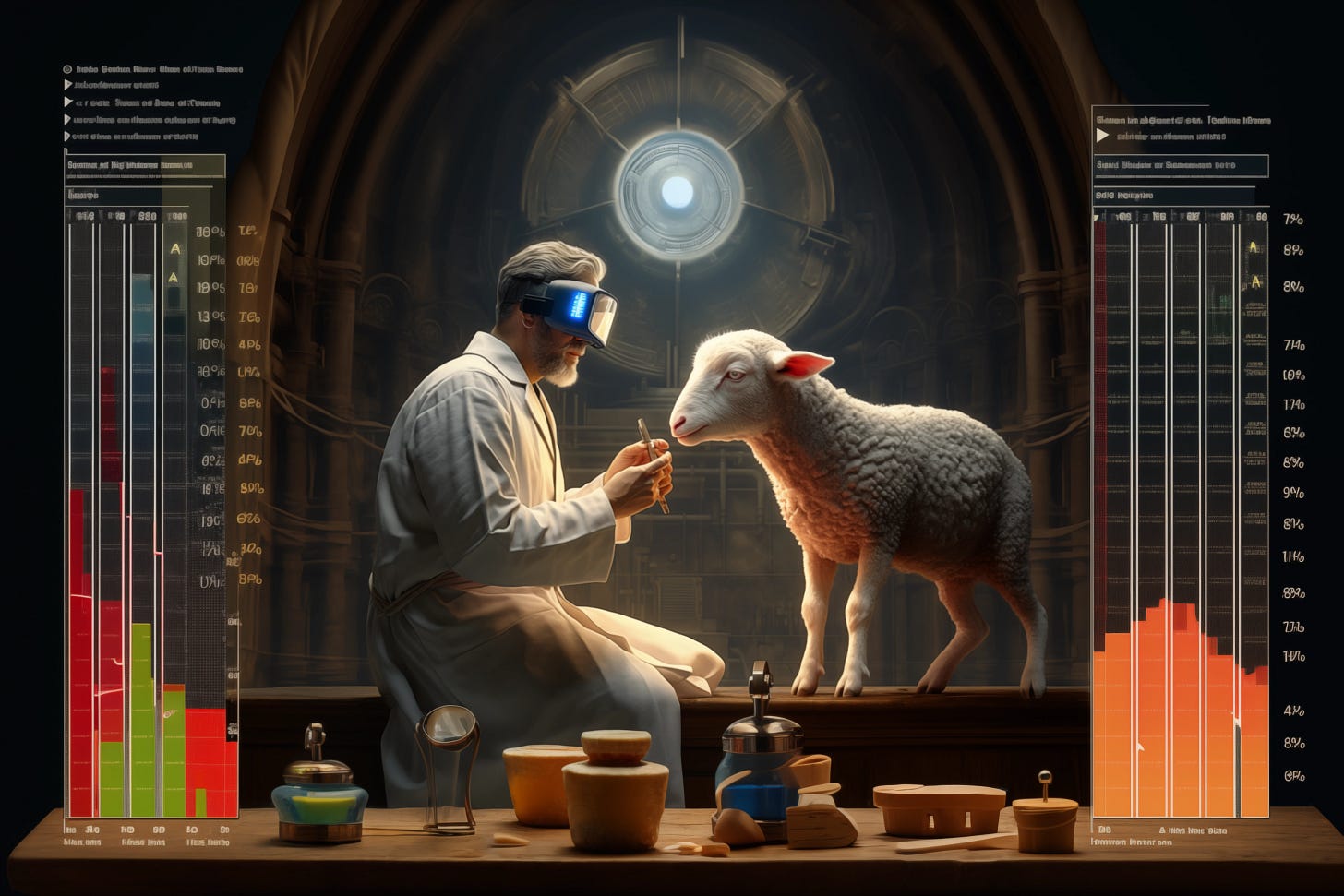I've always believed in God. Conversations with Him have been a part of my life since childhood. During the stillness of night, I would lie in bed, murmuring silently into the darkness, hoping He was listening. Most of us raised with Judaism will have taken belief as a given. Tracing the contours of our thoughts, God lends a subtle context to everything we do. He constitutes the ever-present horizon of our existence.
And yet, even that term, belief, is a loaded one. Its mere utterance draws merciless mockery from New Atheist types: 'Well, I believe in the Flying Spaghetti Monster'. Spirituality jars with our empirically inclined Western psyche like sandpaper on a sunburn. Any proposal transcending physicalism is rejected as antiquated thinking. Religion seems anachronistic - a pitiful refuge for the weak-willed, a relic of some forgotten age. Regardless of how we feel about it, secular society distrusts all assertions unsupported by concrete scientific evidence. Thus, belief ends up a sacrificial lamb on the altar of empiricism.
Ironically, this spiritually hostile environment has sprouted historically diverse expressions of belief. Facing sustained external skepticism, these varying avenues exemplify the individual proclivities of those on faith journeys. For instance, the surge of New Age spirituality in the 1970s responded to modernity's dehumanizing effects. Similarly, spurred by secular academic predominance, religious analytical philosophy has enjoyed a stunning renaissance. Under severe pressure, faith will metastasise novel approaches.
These paths to faith must be diverse because belief, arguably more than anything else, is profoundly personal. Abraham is considered the Father of Faith, yet his spiritual enlightenment process is murky at best. The Torah itself tells us nothing. Our first encounter with this titanic religious figure occurs when he is already in his prime. By this time, Abraham is so established as a servant of God that he is a fully-fledged prophet. The Midrash gives us more to work with. Young Abraham is portrayed as struggling with the nature of the cosmos en route to finally discovering God. But this extra detail only muddies the historic waters, with every commentator offering their own interpretation of Abraham's journey. Was Abraham a metaphysician contemplating reality's structure? An ethicist grappling with life's messy contingencies? Perhaps he was a logician parsing the cosmos' order? Or an existentialist confronting life's uncertainties?
We can't help but feel that the narrative's ambiguity is the point. For if the Torah provided a precise retelling of Abraham's awakening, it might be impossible for us to identify ourselves in his story. A conclusive account would invariably impede such consideration. Instead, the text's restraint leaves room for us to glimpse in it a reflection of our personal journeys. More than a figure from the past, Abraham permeates the present. His genesis story, or rather the lack of one, allows space for an infinite range of God seekers.
Such a smorgasbord of options for reaching or discovering God can be tremendously gratifying. But the pictures we draw of religious types grossly oversimplify the experiences of those engaged in transcendent questioning. While the idea of a fixed personality may or may not be accurate, our spiritual interiority is inscrutably complex. The notion that each of us has 'our one way' of getting to God is naive, even childish. We paint caricatures—the wide-eyed mystic, the cerebral philosopher—when the truth is considerably richer. Such simplistic stereotyping belies our shared frailty in wrestling with existential mysteries that evade tidy solutions.
Religious journeys cannot be so easily categorised. What speaks to us at one stage in life may suddenly ring hollow. The passionate poet finds their writing increasingly cliché, while the academic is shaken by an inexplicable moment of illumination. Emotional pain typically shocks us out of rational slumber, and moments of spiritual ecstasy can be violently shattered by doubt.
Such fluxes and nuanced combinations of approaches are discernible throughout Jewish history. The Rambam was renowned for his philosophical disposition, and yet he famously describes love for God in terms of the romantic obsession one feels for a woman. Rabbi Joseph B. Soloveitchik in Halachic Man is dismissive of the "homo religiosus" who seeks transcendent experience. Nevertheless, he emerges as a multifaceted and vulnerable individual in The Lonely Man of Faith. Even Rav Nachman of Breslov, who rails against philosophical works in defense of subjective experience, had obvious early exposure to such writings.
Why are we condemned to this state of perpetual questioning, never achieving absolute stability in how we relate to God? The answer lies in our spiritual composition. Man's dual constitution encompasses both physical and spiritual spheres. God fashioned Adam's body from clay but breathed life into it. Regarding this, the Zohar teaches that "the one who blows, blows from Himself". We are beings possessing both body and soul. Our physical self is anchored in the material world, attaching us to emotional experiences - human passions, pains and pleasures. Yet our soul, as an infinite divine element, equips us with the capacity for abstract reasoning. The interplay between these dual strands of personal experience leaves us in a constant state of internal tension. We are bifurcated selves, caught in a tug-of-war between the body's subjectivity and the soul's abstraction.

Enlightenment philosopher Rene Descartes conceived man as "a ghost in a machine," with the spiritual soul and mechanical body entirely disconnected. His dualistic approach still permeates modern thought, sustaining our incomplete view of a humanity severed from its spiritual roots. Yet Judaism sees man as a fused singularity, a synthesis of intertwined soul and body. We wander the earth, neither angel nor beast, a hybrid blend of base and sublime. And it is this contradictory nature, this conflicted yearning, that fuels our species' most remarkable acts of creation and destruction.
What use is a spiritual diagnosis if we find no ready-made solution? Our modern sensibilities scream for quick fixes to tangled quandaries, purging discomfort to tune out pain. We frantically pop painkillers, ignoring the underlying root of our suffering. This frenzied search for certainty permeates our philosophical attitudes, too. An underlying Hegelianism envisions that every contradiction ultimately resolves into a satisfying synthesis.
But perhaps we are misguided in pursuing a panacea for humanity's profound inner schism. Maybe there was never meant to be a tidy Disney-like reconciliation. The Danish philosopher Søren Kierkegaard identified the constant interplay between our finite physical selves and infinite spiritual selves as a defining feature of the human condition. For Kierkegaard, authentic living meant embracing life's internal tensions instead of expecting them to fade away. An individual's relationship with God involves an ongoing process of grappling with paradoxes rather than seeking facile resolutions. Navigating between intellectual faith and emotional devotion, reason, and awe involves accepting spiritual complexity as an essential aspect of the journey.
While still early in adulthood, my own spiritual journey has oscillated between emotional and intellectual paths to faith. In high school, I was engrossed in seeking absolute, rational proof of God's existence - scouring internet forums extensively. Upon entering yeshiva, immersed in intensive Torah study and battling anxiety, my focus shifted almost entirely experiential. Right now, I aspire to balance both feelings and intellect. Nevertheless, within this blend, my perspectives still fluctuate between periods where rationality predominates and others where emotions provide more robust insight. Personal circumstances and intellectual interests naturally ebb and flow over time, shaping how I tend to engage with life's enduring challenges.
This endless cycle of progression and regression in our relationship with the divine can sometimes feel tragic. At every moment, the veil lifts to reveal glimpses of illumination, only to fall again. It is easy to feel cast back into a Sisyphean nightmare. But this is a flawed interpretation. Rather than frustrating repetition, each cycle yields fresh understandings and reinforces the strength of the spirit. Far from hindering, these variances allow faith to evolve continuity through change. Like the breathtaking anticipation building between devoted lovers during their engagement, every iteration of closeness and distance lived out between our souls and God reverberates with exquisite intimacy. It is in holding these opposites in dynamic tension, with tolerance for life's complexity and paradox, that we may find a deeper awareness of our spiritual journey.
We continue to pray for the well-being of our Jewish brothers and sisters in Israel
If you enjoyed reading this, feel free to click the ❤️ button on this post so more people can discover it on Substack 🙏






Shalom Jaacov,
I wanted to express how much the article resonated with me. The duality it portrays is a theme that many will surely recognize. It's true, each cycle brings forth fresh understandings.
Awesome